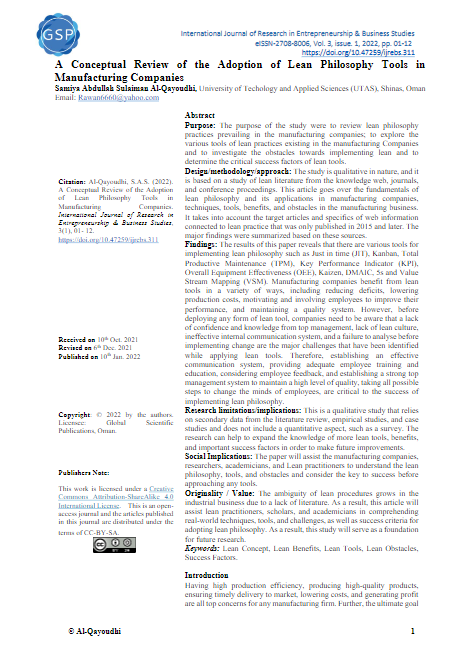A Conceptual Review of the Adoption of Lean Philosophy Tools in Manufacturing Companies
DOI:
https://doi.org/10.47259/ijrebs.311Keywords:
Lean Concept, Lean Benefits, Lean Tools, Lean Obstacles, Success FactorsAbstract
Purpose: The purpose of the study was to review lean philosophy practices prevailing in the manufacturing companies; explore the various tools of lean practices existing in the manufacturing Companies and investigate the obstacles to implementing lean and determine the critical success factors of lean tools.
Design/methodology/approach: The study is qualitative in nature, and it is based on a study of lean literature from the knowledge web, journals, and conference proceedings. This article goes over the fundamentals of lean philosophy and its applications in manufacturing companies, techniques, tools, benefits, and obstacles in the manufacturing business. It takes into account the target articles and specifics of web information connected to lean practice that was only published in 2015 and later. The major findings were summarized based on these sources.
Findings: The results of this paper reveals that there are various tools for implementing lean philosophy such as Just in time (JIT), Kanban, Total Productive Maintenance (TPM), Key Performance Indicator (KPI), Overall Equipment Effectiveness (OEE), Kaizen, DMAIC, 5s and Value Stream Mapping (VSM). Manufacturing companies benefit from lean tools in a variety of ways, including reducing deficits, lowering production costs, motivating and involving employees to improve their performance, and maintaining a quality system. However, before deploying any form of lean tool, companies need to be aware that a lack of confidence and knowledge from top management, lack of lean culture, ineffective internal communication system, and a failure to analyze before implementing change are the major challenges that have been identified while applying lean tools. Therefore, establishing an effective communication system, providing adequate employee training and education, considering employee feedback, and establishing a strong top management system to maintain a high level of quality, taking all possible steps to change the minds of employees, are critical to the success of implementing lean philosophy.
Research limitations/implications: This is a qualitative study that relies on secondary data from the literature review, empirical studies, and case studies and does not include a quantitative aspect, such as a survey. The research can help to expand the knowledge of more lean tools, benefits, and important success factors in order to make future improvements.
Social Implications: The paper will assist the manufacturing companies, researchers, academicians, and Lean practitioners to understand the lean philosophy, tools, and obstacles and consider the key to success before approaching any tools.
Originality / Value: The ambiguity of lean procedures grows in the industrial business due to a lack of literature. As a result, this article will assist lean practitioners, scholars, and academicians in comprehending real-world techniques, tools, and challenges, as well as success criteria for adopting lean philosophy. As a result, this study will serve as a foundation for future research.
Downloads

Published
How to Cite
Issue
Section
License
Copyright (c) 2022 Samiya Abdullah Sulaiman Al-Qayoudhi

This work is licensed under a Creative Commons Attribution-ShareAlike 4.0 International License.



